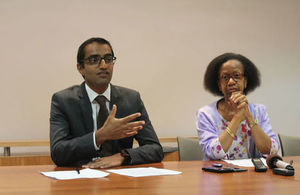UK provides additional humanitarian support for Burundian refugees in Tanzania
The UK is providing an additional 拢5.0 million to help meet the urgent needs of Burundian refugees arriving in western Tanzania.

Head of the UK International Development in Tanzania, Mr. Vel Gnanendran and United Nations High Commission for Refugees, Tanzania Country Representative, Ms. Joyce Mends-Cole
This brings the total UK support to the current refugee influx to 拢14.25 million (c $23 million) since June 2015. The UK previously provided 拢9.25 million for food, medical care and clean water to help the growing number of Burundians who have fled their country since April 2015 to seek safety in Tanzania.
The new funds will support the establishment of two new refugee camps to accommodate new arrivals and relieve the pressure on the current, highly congested Nyaragusu camp. Nyaragusu is currently hosting over 160,000 refugees.
This additional support from the UK comes as the number of Burundian refugees in Tanzania has now reached 100,000. That is half of the 200,000 Burundian refugees in the region, with 250-300 continuing to arrive daily. Aid agencies are struggling to meet their needs. The Burundi Refugee Regional Response Appeal for $300m is only 28% funded.
The UK鈥檚 additional 拢5.00 million package will help up to 50,000 people by providing:
-
拢2.8 million to the United Nations High Commission for Refugees to help establish the new refugee camps, including temporary shelter, emergency medical care and protection for women and girls;
-
拢0.8 million to the International Organisation for Migration to transport people to safe areas in the new refugee camps;
-
拢1.4 million to OXFAM to improve water and sanitation.
Announcing the support, the Head of the Tanzanian office of the UK鈥檚 International Development Vel Gnanendran said:
鈥淭he situation in Burundi continues to deteriorate. Tanzania has shown remarkable generosity in providing refuge to the 100,000 Burundians who sought safety here. The international community needs to play its part as well. That is why the UK has now provided 拢14.25m to help ensure that these refugees, especially women and children, are given the security, dignity and basic services, such as food and water, that are essential for their lives.鈥�
Following the announcement of the support, the United Nations High Commission for Refugees Country Representative, Joyce Mends-Cole said:
鈥淭he contribution, from the UK, comes at a particularly critical time. We are faced with serious challenges 鈥� the imperative to decongest Nyarugusu and to ensure that sites given by the Tanzanian Government are rehabilitated and prepared for the relocation. At the same time as we relocate those from Nyarugusu, we are also receiving an increasing flow of Burundian refugees at several entry points, adding to the already compelling numbers. The UK has been a 鈥渇irst responder鈥� for us, at several points in this crisis. We are deeply grateful. 鈥�
Burundi was plunged into a political crisis when President Nkurunzinza decided to run for a third term. His subsequent election has led to violent unrest and increasing economic difficulties, causing thousands of Burundians to flee to Tanzania, the Democratic Republic of Congo, Rwanda and Uganda. Since April 2015, 200,000 Burundians have fled the country, the majority coming to Tanzania where they are being hosted in Nyarugusu camp, already the home to 60,000 Congolese refugees. The camp now hosts over 160,000 people, a population three times its originally planned size, overcrowding, lack of adequate shelter, water and protection issues poses a real danger to refugees lives- making relocation to new camps essential.
Total UK support across the Region for the Burundian Refugee Crisis is 拢21.15 million (c.$ 33 million).